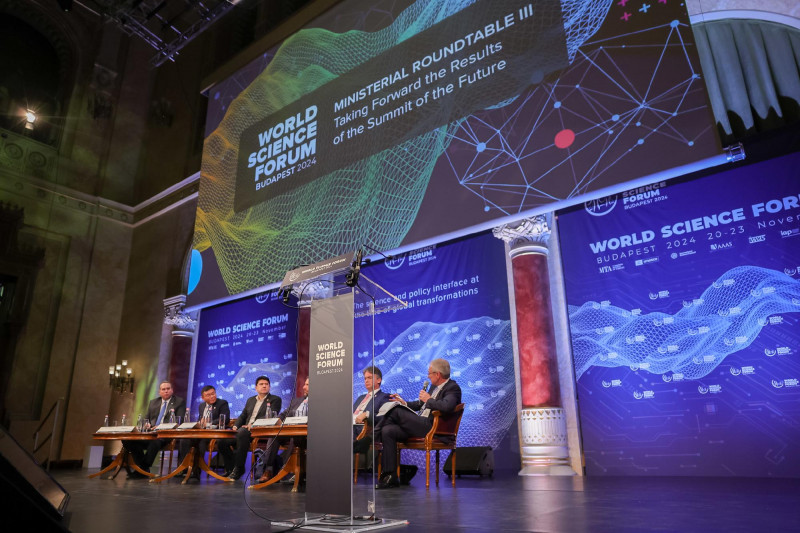World Science Forum Highlights Science Governance and Scientist Freedom in Key Discussions
Day three of WSF 2024 continued in the afternoon of 23 November with thought-provoking sessions addressing critical issues in global science.
Plenary Session IV, titled “Cooperation, Coordination, and Governance in Science”, explored the structural and cultural shifts necessary for fostering trust and collaboration. Later, Ministerial Roundtable IV, “Freedom and Safety of Scientists”, emphasised the need to protect scientists from external threats while promoting trust and inclusivity within the scientific community.
Moderated by Vladimir Šucha, Head of Representation of the European Commission in Slovakia, the plenary session opened with the premise that “cooperation and governance may not seem captivating, but they are essential to strengthening global science.” Speakers consistently emphasised the need to better connect grassroots efforts with institutional leadership and to rebuild trust at every level of society.
Kimberly Montgomery, Director of International Affairs and Science Diplomacy at the American Association for the Advancement of Science (AAAS), highlighted the challenges science diplomacy faces amid the complexities of today’s geopolitical landscape. She showcased the AAAS Science Diplomacy course as a prime example of breaking barriers across disciplines and nations by fostering trust among policymakers, decision-makers and young researchers. General Director Allen Weeks of Extreme Light Infrastructure (ELI) and presented it as a model for excellence in scientific cooperation, demonstrating how cutting-edge laser technology is advancing innovation while fostering regional pride and retaining young talent.
Lidia Borrell-Damián, Secretary General of Science Europe, called for a fundamental shift in how partnerships are formed, advocating for an end to hierarchical, publication-driven models. She urged global partnerships based on respect and reciprocity, suggesting that G7 and G20 nations could play a key role in delivering tangible results through science. Quebec Chief Scientist Rémi Quirion, who is also President of the International Network for Governmental Science Advice (INGSA), encouraged scientists to move beyond cooperation and governance by prioritising active, transparent collaboration. His call to “give up power” and engage directly with global citizens struck a chord with attendees.
The session also showcased examples of inclusive scientific governance. Atish Dabholkar, Director of The Abdus Salam International Centre for Theoretical Physics (ICTP), highlighted the need for advanced tools and technologies, like AI, to be globally accessible, particularly for the Global South. This inclusivity, he argued, is essential in tackling global issues like climate change and energy challenges. Vladimir Šucha concluded the session with a powerful reflection on the role of trust in science and the urgent need for better communication between researchers and policymakers.

At Ministerial Roundtable IV, “Freedom and Safety of Scientists”, Lidia Brito, Assistant Director-General for Natural Sciences at UNESCO, opened the discussion by addressing the myriad challenges scientists face, from societal mistrust to political pressure, and even personal safety threats. Panellists shared perspectives on how institutions are working to address these issues.
Asad Ramzanali, Special Assistant to the President and Chief of Staff and Deputy Director for Strategy at the White House’s Office of Science and Technology Policy, emphasised that scientific freedom extends beyond academic expression to include the freedom to live authentically and pursue meaningful work. Cecil Buti Masoka from South Africa’s National Department of Science, Technology and Innovation, highlighted the discrimination scientists from the Global South face, noting the importance of allowing researchers to conduct quality work in their home countries.
Quarraisha Abdool Karim, President of The World Academy of Sciences (TWAS), warned of the long-term impacts of conflicts that disrupt scientific communities, leaving societies without qualified experts for decades. Matthias Johannsen, Executive Director of All European Academies (ALLEA), outlined the multiple freedoms scientists need, from access to education and mentorship to the ability to communicate and apply knowledge for the public good.
The session also addressed the role of institutions in elevating trust. Gustavo Merino, Director of Social Polices at UNESCO, highlighted a programme dedicated to improving the global safety and freedom of scientists, emphasising the importance of alliances and innovative communication strategies. Consultant Tracey Elliott introduced a bottom-up movement advocating for peaceful science activism to influence policy and promote scientific understanding.
The roundtable concluded with a unified call for action. Panellists emphasised that freedom in science comes with responsibility, and building trust between the scientific community and society is paramount. Strengthening communication and outreach could reduce the threats scientists face both online and in the real world, ultimately creating a safer, more inclusive environment for researchers.